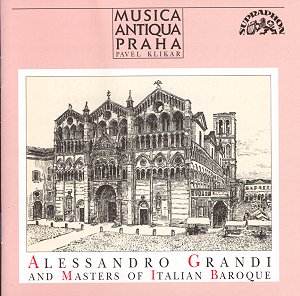Alessandro Grandi is a much-underestimated figure of
the early baroque. He wrote mostly church music as represented here,
but there are also accompanied madrigals and solo concertos. Among his
appointments were positions as maestro di capella at St. Mark’s, Venice
from 1620, where as a boy he had sung in the choir under Gabrieli, and
later at Santa Maria Maggiore, Bergamo from 1627. Here he was happy
he had a choir at his disposal "and instrumentalists, and enjoyed
artistic freedom, all-round support and respect" (booklet notes
by the director, Pavel Klakar). Sadly he died of the plague within three
years of his appointment.
From about 1610, the year that Gabrieli died, his works
started to be published. At first these were mostly motets for a few
voices eg. ‘Caecilia’, and ‘Salvum me fac’. He further developed the
genre of the solo motet with obbligato strings in his next publications.
This is in the so-called ‘stile concertato’ which influenced many composers
for the next three generations. Examples of this strand include Veni
Sancte Spiritus and the longest work on the CD O Quam Speciosa.
In these works the verse structure of a hymn like Veni Sancte
is broken up by a passage for solo strings to give variety and length
whereas in a work like Salvum fac me the text is quickly declaimed
with minimal accompaniment from continuo, in these performances often
chittarone and organ.
Grandi’s motets have featured on recordings before
normally only in the context of his contemporaries especially Monteverdi
whom he knew well. The counter-tenor Robin Blaze selects two early works
on ‘Salve Regina’ (Hyperion CDA67225). Later more expressive and mannered
motets can be heard on ‘Venice Preserv’d’, the Academy of Ancient Music
( L’Oiseau-Lyre 425 891-2) and on Venetian Vespers disc directed by
Paul McCreesh (Archiv 437 552 –2). This then is the first time, to my
knowledge, that Grandi has been able to stand by himself. Works from
his second book of 1617, his third book of 1618, and four later publications,
are chosen. In addition the motets Venite Filii, and Deus
Miseratur are played, highly successfully, by instruments alone,
so that with the four other instrumental works the disc is nicely balanced
and one could play it straight through without too much of a sense of
déja-vu. Not only that but the performances are quite beautiful
and never jar. One moves from a work for a male soloist to one by a
female or two females. There is constant variety and the whole plan
is excellently worked out. There are in all six singers and no less
than ten instrumentalists playing ‘authentic instruments’, as the cover
boasts, but there is no list of the age of the instruments or of their
makers. The performances are totally reliable and delightfully done.
I especially enjoyed the string playing.
There is an adequate booklet essay translated into
French and Czech but no texts are provided in any language. In addition
at less than 50 minutes one might feel rather short-changed. I suspect
that the recording was originally intended for the Eastern European
LP market though the recording date rather does not sit well with that
assumption.
To sum up: a series of very fine renderings of rare
but important repertoire well worth getting to know.
Gary Higginson
